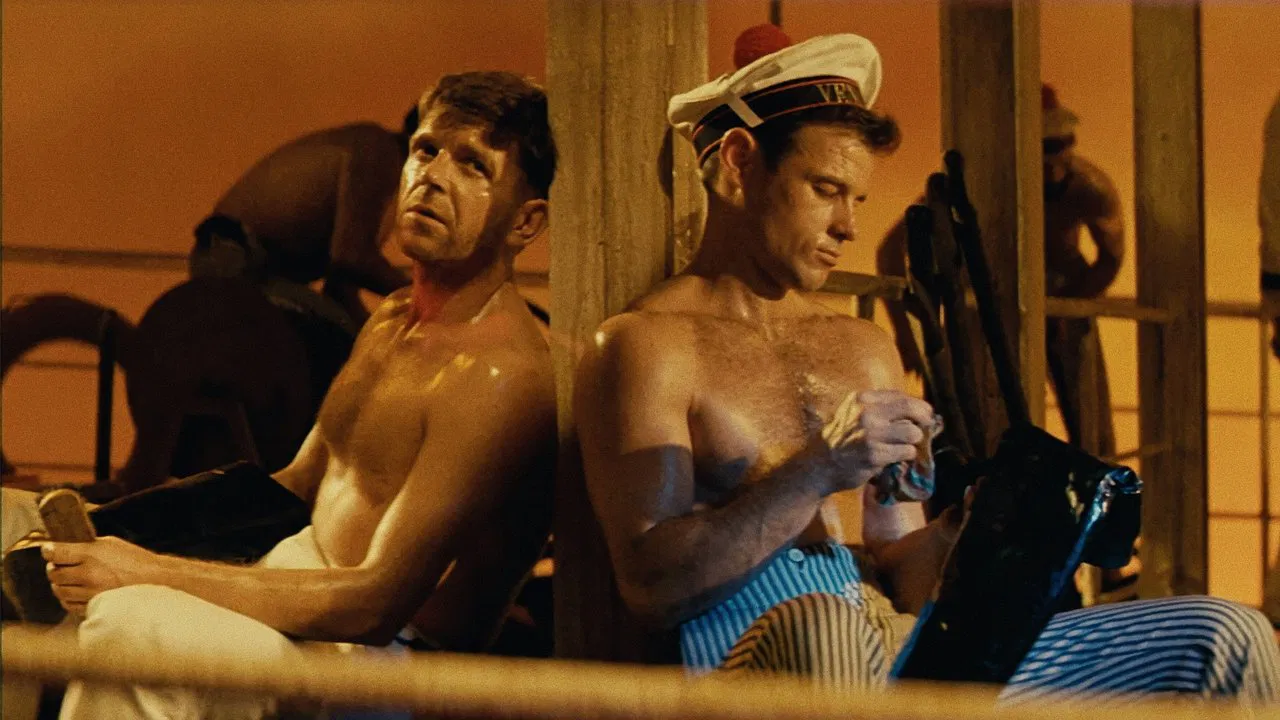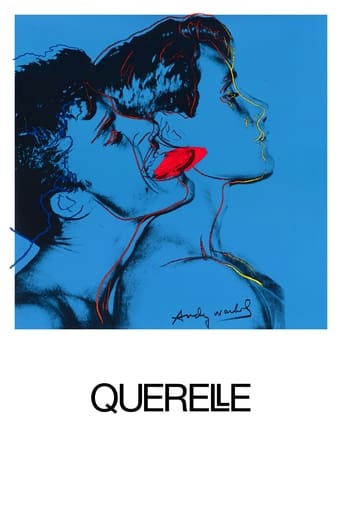

"Homosexuality is not a topic at all in this movie", Rainer Werner Fassbinder answered in his last interview to Dieter Schidor, "the topic is the identity of everyone and how he gets it" (Robert Fischer, Fassbinder Über Fassbinder, Berlin 2004, p. 621). Querelle, therefore, depicts an Utopian new world, the word "Utopian" having its proper sense, since: "the Brest, as described by Genet, it a totally invented one, it does not exist at all, except perhaps in a bar in Texas" (Fassbinder, Loc. Cit., p. 619). In "Der Bauer Von Babylon", directed by Schidor - a film that, broadcast only once by the German TV, should be put as a special on a new edition of "Querelle"! -, Fassbinder added that, for the first time in his career, he filmed the whole movie in the studio. Fassbinder's art director and Oscar-winner Rolf Zehetbauer had crated a wholly artificial and artistic environment, a ship-like island with the bar in the center. The question why Fassbinder did not decide for any real landscape, he answered: "Because every real environment has something holy". It turns out that what is holy is not holy because it is untouched or untouchable, but it is holy because it bears traces of others who have left them in this particular place, building, table (so-to-say relics, as in the Catholic church). Hence, in a last consequence of Fassbinder's idea, if you choose any establishment to open your set, it always also transports the memories of all those who had been there before. If you walk through the alleys of Vienna - auteur and Nobelpreis-nominee Heimito Von Doderer remarked -, you breathe the smell of the centuries that are in the walls and under the streets. (In this way, metaphysics of everyday-life is born.) Which place you ever choose for your film, it has this "inherited defect" of been metaphysically immersed. The holy is that which bears the traces and therefore will never be yours alone, yet you will never be alone either, if you chose to reside in such places. On the other side, the profane is the untouched, it is profane because it does not bear any traces and thus will not connect you and the centuries past into a "holy" cosmos of memories which only establish you as a part of history, the common history namely of you and the place of your destination. Therefore, it does not astonish that all apocalyptic scenes in Fassbinder's work (e.g. the 14th part of "Berlin Alexanderplatz") are places, where the traces (signs by their very nature) come back to live like it is said to be happen on doomsday. For his "Epilog" to "Alexanderplatz", Fassbinder even had a gigantic cemetery constructed on the set in Geiselgasteig, where the graves open after Biberkopf enters this street, known to him well from his former life, but whose traces he never had seen before. Now they manifest themselves and dance a dance macabre with him as their center.
... View MoreQuerelle is an erotic fable about several closeted tough guys loitering around the French Navy port Brest, in some indeterminate timeframe. In a go-for-broke concept, Q shines a spotlight on the latent homosexuality in supposedly straight activities like the military, gambling, fighting, ports-of-call, whore-houses, etc.. It has more fetish imagery for gay men than Ben Hur or the Ten Commandments.Basically five or six male figures ponder, intellectualize and ruminate themselves into and out of mechanical couplings. Genet's fringe figures (...the most verbal, stylized brutes ever) wrestle with their suppressed homosexual urges, but remain inactive until a suitable pretext can be found to copulate with the guy who's driving them to distraction, or, (just as good) till they find some criminal outlet to discharge their energy. It's all loosely strung together by an occasional narrator who's a few mint juleps away from a coma. It's as fragmented as Petronius' Satyricon, and Genet himself, writing from prison, was always a million analytical miles away from his own experiences. It's no surprise that a Genet film has problems with forward momentum and bogs down in ideas: weird, erotic, complex and spiritual. With the amount of time you'd need to spend viewing and re-viewing this incoherent movie to get something out of it, why not read the book?Even if you can get past the artifice of the unsubtle stage set (with its faux-masonry phalluses), this would still be over the top; as campy as humanly possible because the acting has been taken to such a strange level of abstraction. "A" will overtly tell "B" what B's backstory and emotional temperament are, as an odd way to get info to the audience ...and the story still ends up emotionally and psychologically diffuse. It feels like a half-hearted dress rehearsal, where everyone has been told to suppress all hints of their motivations.You could find any number of things here to mock, but for me Brad Davis' bloodless line readings are toxic. Kudos to him for taking on such a difficult project, but as the central figure, his muted performance is just too flat to hold the movie together. His entire audition may have consisted of the single line, "Could you oil up and try on this tank top?" It's a mystery why Rocky Horror became a cult movie with lines shouted back at its absurdities, but this didn't. (...guy in dragon-lady drag? check! ...twinkie in Shirley Temple wig? check!)Querelle is an experimental, epic piece of erotic deflation, generally too challenging, complex and inert for any audience that it might reach, ...kind of like a Genet book actually. It expects a certain maturity from an audience, to grapple with its dense weave of sexual ideas, but it's also pretty darned silly on its face. You can explore the transcendent aspects of sex and crime by entering Genet's world, or you could just go have some forbidden sex and rob a convenience store ...then ruminate.
... View MoreWell, i've been reading the comments about Fastbeenthere's film, and i think the deep religious character and mood of this moving film it's strangely overshadowed. So let's state it clear: Querelle, a pact with the devil, is mostly concerned with religion - from Latin RELIGARE: rebind -, in times when the churches are some kind of agents of the Control Flux - and sorry for these Borroughsian vocabulary -. The quest Querelle undertakes, is the same quest that we found in the poems by San Juan of the Cruz, or in the desert exile of Simon Stilytes, or in Siddharta's long journey... But in Querelle's case there's something more, something inhuman, because this angel-man is forced to develop an absolutely new series of values - Nietzsche -. All these themes are already in Genet works, and also, as an example, in Yikuo Mishima's works: Descensus ad Inferos as a form to rich the realms of heaven. So this devil which Querelle approaches is nothing but an outcast god - and gods are only gods if they are outcasts -, the only possible god for the rejected, for those confined at the end of the world - let's remember here the fight between Querelle and his brother, Robert, and we'll see that the road where this fight occurs takes to nowhere, well, yes, it takes to a dying sun, to the vacuum, the void, the infinite falling -. Concerning the queerness of the film, i would say that this is something really complex: again, the sexual scene between Querelle and Nono has a sacramental mood, and ritual characteristics - as the assassination of the sailor by Querelle - which make of this scene something else: not only an exposition of human, maybe depraved, desires, but of a desire to reach the unreachable: god or devil, never mind. In this scene, Querelle is baptized, and Dodo, the black monster, plays the role of John the Baptist. All is rebound to religion, even the music, and the "nomansland's" aspects of the xerography in this crazy and beautiful film.
... View MoreA very difficult film, for many reasons. As a source novel, Genet's 'Querelle' presents a challenge for any adaptation but as this is R.W. Fassbinder's final work, one is compelled to ignore one's initial (poor) response and dig for signs of the vision seen elsewhere in his cannon.This is a film that unrelentingly refuses to let the viewer in. Narrative is piled upon narrative which is further punctuated by Brechtian title cards containing quotes from a variety of sources (including, of course, Genet's novel). The high stylisation of setting and performance is deliberately off putting and distancing. In this world of almost exclusive homosexual desire, women are severely marginalised which leaves the great Jeanne Moreau with little to do other than warble a rather ridiculous (and ridiculously catchy) pop ditty that uses Oscar Wilde's 'Ballad of Reading Gaol' for lyrics. Here, choice of sexuality is symbolic for how one stands in opposition to social rules and true fulfilment and depth of being comes only in humility and, ultimately, humiliation. Of course, much of this overtly gay posturing can be seen simply as high camp and add an undeniable veneer of silliness which is, quite frankly, hard to shake off.However, this is a deeply serious film. Maybe Fassbinder was simply looking to upset as many people as he could and the whole point is to alienate the viewer as much as possible, either into anger or submission. It's hard to fully know what to make of 'Querelle' but either way, although stunningly lit, it has little of the swagger or movement of his best work and comes across as rather staid and inert. But, again, possibly that's the point. Confusion and denial as to individual identity leads to frustration and random acts of violence (if only to oneself) and self imploding inertia. It's hard to criticise a film that is deliberate about these points but, ultimately, it is equally hard to like and finding a place for it is no easy task. Possibly a work to admire and provoke rather than one to enjoy.
... View More